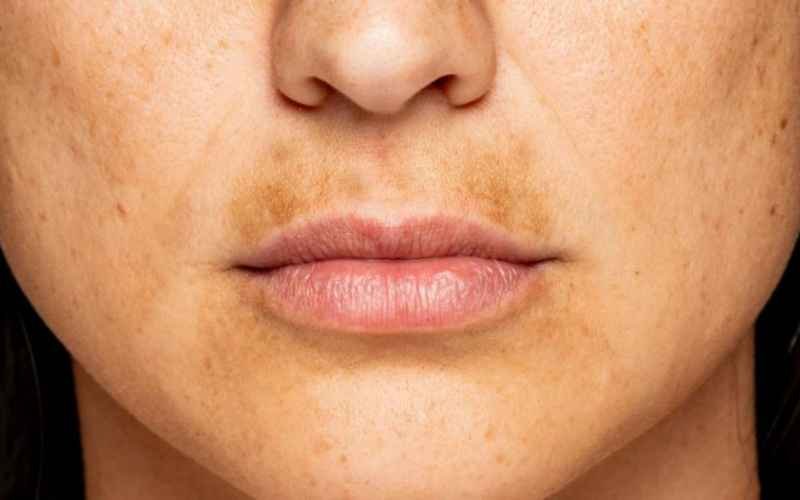Hyperpigmentation: Effective Topical Treatments for Dark Spots and Uneven Skin Tone
Hyperpigmentation is a common skin condition characterized by patches of skin that become darker in color than the surrounding skin. It can be caused by various factors such as sun exposure, hormonal changes, inflammation, and injury to the skin. While hyperpigmentation is not harmful, it can affect one’s self-esteem and confidence. Fortunately, there are several topical treatments available that can help fade dark spots and even out skin tone. In this blog post, we will explore some of the most effective topical treatments for hyperpigmentation.

1. Vitamin C Serums: Vitamin C is a powerful antioxidant that helps brighten the skin and reduce the appearance of dark spots. When applied topically, vitamin C serums can inhibit melanin production, the pigment responsible for dark spots. Look for serums with a high concentration of vitamin C and apply them daily for best results.
2. Hydroquinone Creams: Hydroquinone is a topical agent that works by inhibiting melanin production in the skin. It is one of the most effective treatments for hyperpigmentation and is available over the counter in low concentrations and by prescription in higher concentrations. However, hydroquinone should be used with caution and under the guidance of a dermatologist, as prolonged use can lead to skin irritation and other side effects.
3. Retinoids: Retinoids, such as retinol and tretinoin, are derivatives of vitamin A that promote cell turnover and stimulate collagen production in the skin. They can help fade dark spots and improve overall skin texture and tone. Retinoids are available in both prescription-strength formulations and over-the-counter products. Start with a lower concentration and gradually increase as tolerated to minimize the risk of irritation.
4. Alpha Hydroxy Acids (AHAs): AHAs, such as glycolic acid and lactic acid, are exfoliating agents that help remove dead skin cells and promote cell turnover. They can help fade dark spots and improve the appearance of uneven skin tone. AHAs are commonly found in skincare products such as cleansers, toners, and serums. Start with a lower concentration and gradually increase as tolerated to avoid irritation.
5. Licorice Extract: Licorice extract contains an active ingredient called glabridin, which has been shown to inhibit melanin production and lighten dark spots. It also has anti-inflammatory properties that can help reduce redness and irritation. Look for skincare products containing licorice extract as an ingredient, such as serums and creams.
Conclusion: Hyperpigmentation can be a frustrating skin concern, but with the right topical treatments, you can fade dark spots and achieve a more even skin tone. Vitamin C serums, hydroquinone creams, retinoids, alpha hydroxy acids, and licorice extract are all effective options for treating hyperpigmentation. However, it’s important to remember that results may vary depending on the individual and consistency is key when using topical treatments. Additionally, always wear sunscreen during the day to protect your skin from further damage and consult with a dermatologist if you have any concerns or questions about treating hyperpigmentation. With patience and dedication to a skincare routine, you can achieve a brighter, more radiant complexion.
Top 20 FAQs about Hyperpigmentation
1. What causes hyperpigmentation? Hyperpigmentation can be caused by various factors including sun exposure, hormonal changes, inflammation, skin injuries, and certain medications. These factors can stimulate the production of melanin, the pigment responsible for skin color, leading to dark spots and uneven skin tone.
2. Who is most at risk for developing hyperpigmentation? Anyone can develop hyperpigmentation, but certain individuals may be more prone to it. Those with darker skin tones, a history of sun exposure, hormonal fluctuations (such as during pregnancy or while taking birth control pills), and a family history of hyperpigmentation are at higher risk.
3. Can hyperpigmentation be prevented? While it may not be possible to prevent hyperpigmentation entirely, there are steps you can take to minimize its occurrence. These include wearing sunscreen daily, avoiding excessive sun exposure, using skincare products with antioxidants, and managing underlying health conditions that may contribute to hyperpigmentation.
4. Are there different types of hyperpigmentation? Yes, there are different types of hyperpigmentation, including sunspots (also known as solar lentigines), melasma, post-inflammatory hyperpigmentation (PIH), and age spots (also known as liver spots). Each type may have different underlying causes and may require different treatment approaches.
5. How is hyperpigmentation diagnosed? Hyperpigmentation is usually diagnosed based on a visual examination of the skin by a dermatologist. In some cases, a skin biopsy may be performed to rule out other skin conditions or to confirm the diagnosis.
6. Can hyperpigmentation go away on its own? In some cases, hyperpigmentation may fade on its own over time, especially if it is caused by temporary factors such as sun exposure or hormonal changes. However, for persistent or stubborn hyperpigmentation, topical treatments or procedures may be necessary to achieve desired results.
7. What are the most effective topical treatments for hyperpigmentation? Effective topical treatments for hyperpigmentation include vitamin C serums, hydroquinone creams, retinoids, alpha hydroxy acids (AHAs), licorice extract, and niacinamide. These ingredients work by inhibiting melanin production, promoting cell turnover, and brightening the skin.
8. How long does it take to see results from topical treatments for hyperpigmentation? The time it takes to see results from topical treatments for hyperpigmentation can vary depending on the severity of the condition and the specific treatment used. In general, it may take several weeks to months of consistent use before noticeable improvements are seen.
9. Are there any side effects associated with topical treatments for hyperpigmentation? Some topical treatments for hyperpigmentation, such as hydroquinone and retinoids, may cause skin irritation, redness, dryness, or increased sensitivity to sunlight. It’s important to follow the instructions provided by your dermatologist and to use these treatments as directed to minimize the risk of side effects.
10. Can hyperpigmentation be treated with laser therapy? Yes, laser therapy is a common treatment option for hyperpigmentation. Lasers work by targeting and breaking up excess melanin in the skin, leading to a more even skin tone. Multiple sessions may be required to achieve optimal results, and downtime may be needed depending on the type of laser used.
11. Is hyperpigmentation more common in certain ethnicities? Hyperpigmentation can affect individuals of all ethnicities, but it may be more noticeable in individuals with darker skin tones due to increased melanin production. Additionally, certain types of hyperpigmentation, such as melasma, are more common in individuals with darker skin.
12. Can hormonal changes during pregnancy cause hyperpigmentation? Yes, hormonal changes during pregnancy can lead to a condition called melasma, also known as the “mask of pregnancy.” Melasma causes dark patches to appear on the face, typically on the cheeks, forehead, and upper lip. While melasma often fades on its own after pregnancy, topical treatments may help expedite the process.
13. Can hyperpigmentation be worsened by sun exposure? Yes, sun exposure can exacerbate hyperpigmentation by stimulating melanin production in the skin. It’s essential to wear sunscreen daily and to avoid prolonged sun exposure, especially during peak hours, to prevent further darkening of existing spots and to protect the skin from UV damage.
14. Are there any natural remedies for hyperpigmentation? Some natural ingredients may help improve the appearance of hyperpigmentation, such as aloe vera, green tea extract, licorice extract, vitamin C, and niacinamide. While these ingredients may offer some benefits, they are not as potent as prescription-strength treatments and may take longer to show results.
15. Can hyperpigmentation be a sign of an underlying health condition? In some cases, hyperpigmentation may be a symptom of an underlying health condition such as Addison’s disease, hemochromatosis, or certain vitamin deficiencies. If you notice sudden or widespread changes in your skin pigmentation, it’s essential to consult with a healthcare professional for proper evaluation and diagnosis.
16. Can hyperpigmentation be treated with chemical peels? Yes, chemical peels are a common treatment option for hyperpigmentation. Peels work by exfoliating the outer layer of the skin, promoting cell turnover, and reducing the appearance of dark spots and uneven skin tone. Superficial peels are often used for mild hyperpigmentation, while deeper peels may be necessary for more severe cases.
17. Can over-exfoliation worsen hyperpigmentation? Yes, over-exfoliation can disrupt the skin barrier and lead to irritation, inflammation, and worsened hyperpigmentation. It’s essential to exfoliate gently and avoid using harsh scrubs or chemical exfoliants too frequently, especially if you have sensitive or hyperpigmented skin.
18. Can hyperpigmentation be hereditary? Yes, genetics may play a role in the development of hyperpigmentation. Individuals with a family history of hyperpigmentation may be more predisposed to developing the condition themselves. However, environmental factors such as sun exposure and hormonal changes also play significant roles in the development of hyperpigmentation.
19. Can hyperpigmentation be treated with over-the-counter products? Yes, some over-the-counter products may help improve the appearance of hyperpigmentation, such as vitamin C serums, alpha hydroxy acids (AHAs), and licorice extract creams. While these products may offer some benefits, they are typically less potent than prescription-strength treatments and may take longer to show results.
20. Is it possible to completely get rid of hyperpigmentation? While it may not always be possible to completely eliminate hyperpigmentation, significant improvements can often be achieved with proper treatment and skincare. Consistent use of topical treatments, laser therapy, chemical peels, and sun protection can help fade dark spots and even out skin tone, leading to a brighter and more radiant complexion. It’s essential to work closely with a dermatologist to develop a customized treatment plan tailored to your specific needs and concerns.
Register for My Upcoming Masterclass HERE
See You in the Live Masterclass
Sunil Chaudhary stands as a preeminent global Leading digital coach, boasting a diverse clientele hailing from over 50 nations. Renowned for his prowess as an exemplary SEO expert, business automation coach, and landing page authority, Chaudhary also holds the distinction of being esteemed as the finest business coach in India. Beyond technical domains, he imparts invaluable insights into mindset, success, and life skills, thus encompassing a holistic approach to mentorship.
Join FREE Courses HERE
Know The Author:
 Sunil Chaudhary aka Suniltams Guruji is India’s Leading Digital Coach. He provides complete Digital Skill Development Coaching with great support. Sunil has trained more than 25000 students and helped more than 1100 businesses so far. Sunil is a well-known face across the world for Digital Coaching.
Sunil Chaudhary aka Suniltams Guruji is India’s Leading Digital Coach. He provides complete Digital Skill Development Coaching with great support. Sunil has trained more than 25000 students and helped more than 1100 businesses so far. Sunil is a well-known face across the world for Digital Coaching.
Digital Success Coach | Best SEO Coach India | Mindset Coach | Life Success Coach
Related posts:
 From Coffee to Almond: 5 Great Homemade Face Scrubs for Brides-to-Be to Get Radiant Skin
From Coffee to Almond: 5 Great Homemade Face Scrubs for Brides-to-Be to Get Radiant Skin
 Navigating Rheumatoid Arthritis and Preeclampsia During Pregnancy
Navigating Rheumatoid Arthritis and Preeclampsia During Pregnancy
 Severe Postpartum Hemorrhage: Early Recognition and Preventive Measures
Severe Postpartum Hemorrhage: Early Recognition and Preventive Measures
 The Health Benefits of Evening Workouts for People with Obesity
The Health Benefits of Evening Workouts for People with Obesity
 “Summer Gut Health: Essential Tips for a Happy Gut”
“Summer Gut Health: Essential Tips for a Happy Gut”
 Healing Varicose Veins with Ayurvedic Therapies: A Natural Approach to Wellness
Healing Varicose Veins with Ayurvedic Therapies: A Natural Approach to Wellness
 The Power of Coconut Water: Unveiling Its Incredible Health Benefits and the Best Time to Savor the Summer Drink
The Power of Coconut Water: Unveiling Its Incredible Health Benefits and the Best Time to Savor the Summer Drink
 The Secrets of Lip Balm: Your Ultimate Guide to Soft, Supple Lips
The Secrets of Lip Balm: Your Ultimate Guide to Soft, Supple Lips
 Say No to Tea and Coffee Before and After Meals, Advises Top Medical Body ICMR
Say No to Tea and Coffee Before and After Meals, Advises Top Medical Body ICMR






